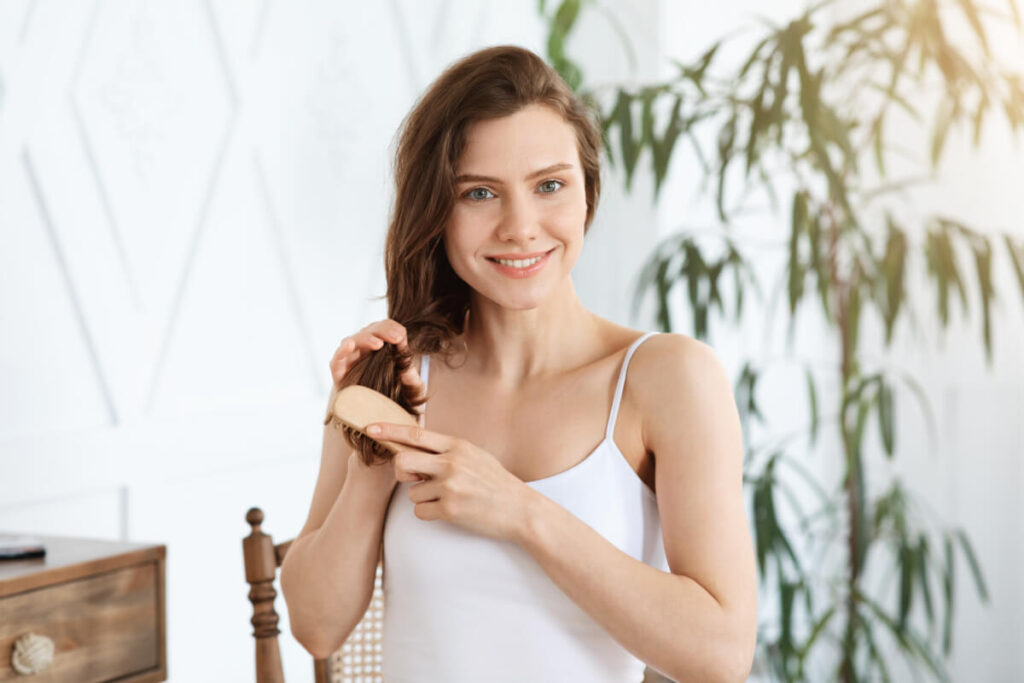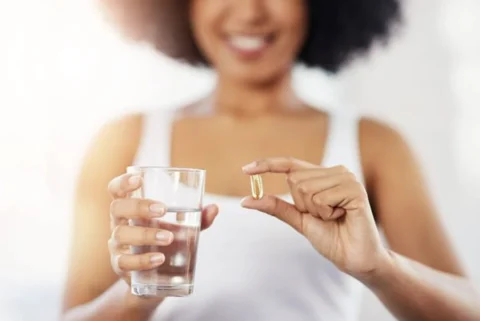The latest beauty trends highlight naturally healthy features. This includes a head of soft and healthy hair that’s free of flaking or sign of damage. To help achieve this, many people are turning to hair care products and nutritional supplements filled with vitamins and minerals that can have beneficial effects on hair. One of these vitamins is vitamin A.
So what can vitamin A do for your hair? With the right amount, vitamin A can help with healthy hair growth,making it stronger and thicker. It can also help keep your hair hydrated and prevent brittle hair breakage. However, too much vitamin A can also have negative effects, as vitamin A speeds up hair growth and could eventually cause it to fall out more quickly. Here’s what you should know about vitamin A and why a balanced amount is necessary to benefit from its effects.
What Does Vitamin A Do for Your Hair?
People with vitamin A deficiencies can notice weaker hair that’s more prone to breakage and hair loss. With the right amount of vitamin A in your body, it can help with hair growth and hydration. But add too much vitamin A to your hair or to your diet, and there’s a risk of re-developing hair loss. Here are the different things vitamin A might do to your hair.
The Good Side
Vitamin A plays an important role in your body. Aside from its effects on your hair, skin, and nails, it can also help improve your vision, immunity, and productive health. Vitamin A also has antioxidant properties, which can help against free radicals and oxidative stress.
For hair, in particular, there are two functions where vitamin A is essential to good hair growth: cell growth and sebum production.
Improves Cell Growth
Cells make up the different tissues in our body. Our hair is the fastest-growing tissue, and how well cells grow and build your hair can depend on vitamin A as one of the essential components. Healthy hair starts from the roots, which is where new cells form at the base of the follicle. These cells then multiply and form the blocks of what becomes our hair.
Vitamin A can affect cell growth, so enough vitamin A in your body can lead to stronger and thicker hair. It won’t affect existing hair and will only apply to the new shaft that sprouts out of your scalp.
Assists Sebum Production
Sebum is a naturally-occurring oil your body produces. The sebaceous glands inside your skin layers release sebum, which is distributed from the hair follicle down to the hair shaft. Your body’s oil production is responsible for keeping healthy skin, scalp, and hair sufficiently hydrated.
For your scalp, this means a moist scalp that’s less prone to dryness and flaking. For your hair, this means healthy-looking hair that’s not prone to drying out, which can result in brittle hair.
The Bad Side: Hypervitaminosis A
Too little vitamin A isn’t good for your hair, but neither is too much of it. When your body has too much vitamin A, you can develop a condition called hypervitaminosis A or vitamin A toxicity. Vitamin A is a fat-soluble vitamin that’s stored in your liver, but it can only store so much before there are excess amounts of vitamins stored in your body. Aside from hair fall, dry skin, and cracked fingernails, you can also experience a number of serious symptoms like abdominal pain, nausea, and increased pressure on your brain.
There are two types of vitamin A: preformed vitamin A and provitamin A carotenoids. Your body works with preformed vitamin A substances like retinol, while provitamin A carotenoids like beta-carotene are converted into retinol before your body can use it. Retinol is essential for triggering most of the benefits associated with vitamin A. For your hair, it’s associated with improving blood flow to your scalp and hair follicles, regulating sebum, and removing scalp debris like flakes to help hair care products penetrate the scalp.
But in large amounts, it can overstimulate your hair follicles. Rather than your hair reaching the end of its growth phase naturally, retinol speeds up the process and triggers the part of your hair’s cycle when it starts to shed. This can cause significant hair loss in certain areas. However, while your hair is shedding quickly due to overstimulation, your body cannot stimulate hair regrowth fast enough to replace it.
How Much Vitamin A Is Safe?

Based on the Institute of Medicine, the recommended dietary allowance of vitamin A in adults is 900 micrograms of retinol activity equivalents (RAE) for men and 700 micrograms RAE for women. That’s equal to 3,000 international units (IU) for men and 2,300 IU for women.
To avoid developing hypervitaminosis, you should not take more vitamin A than its tolerable upper intake level. This refers to the highest daily intake you can have that won’t have a negative effect on your health. For vitamin A, this is up to 3,000 micrograms for adults.
Natural Dietary Sources of Vitamin A
But how do you know if you’ve reached your recommended dietary allowance or your tolerable upper Intake Level? If you’re practicing a balanced diet that includes these foods rich in vitamin A, you’re likely getting your recommended dose:
- Dairy products
- Eggs
- Fatty fish (tuna, salmon, trout, sardines, etc.)
- Fish oil
- Liver (beef, pork, chicken)
- Leafy green vegetables
- Orange, yellow, and red vegetables (carrots, sweet potato, bell peppers, squash)
- Tomatoes
- Mangoes
Foods that come from animals contain preformed vitamin A like retinol, while plant-based food sources contain provitamin A carotenoids like beta-carotene, which our bodies convert to vitamin A.
Should I Take Vitamin A Supplements?
Vitamin A supplements are best recommended for those with a vitamin A deficiency. If you have a balanced diet that includes vitamin A-rich food, you’re likely getting all the vitamin A you need. But if you want to be certain, you can consult a doctor and have blood tests done to determine if you have a vitamin A deficiency. If you do, your doctor may recommend you take vitamin A supplements, which are a source of preformed vitamin A.
Because a lot of sources of vitamin A are animal-based, people with vegan and vegetarian diets may not have access to preformed vitamin A. Some may be able to get the vitamin A they need by consuming fruits and vegetables rich in beta-carotenes their bodies can convert to vitamin A. But for those with medical conditions that make it difficult to absorb or convert beta-carotenes, vitamin A supplements can help you meet your daily vitamin A intake.
Other Vitamins That Can Improve Hair Growth

Other vitamins and nutrients can have an effect on your hair. If you don’t have a vitamin A deficiency, having other vitamin deficiencies can also lead to poor hair health. These are the other vitamins you should consider getting tested for on top of vitamin A to see if you have a potential deficiency and should take supplements.
Vitamin B Complex
Most B-vitamins can help with improving your circulatory system and bringing blood flow to the scalp and hair follicles. This can provide your hair with the oxygen it needs to grow properly. A biotin deficiency (Vitamin B7), in particular, is linked to hair loss in humans. Most B vitamins are found in both animal and plant-based food sources, but the best sources of vitamin B12 are in animal products, so vegans and vegetarians may need supplements.
Vitamin C
Vitamin C is an antioxidant that can help hair growth in several ways:
- Blocks free radical damage and oxidative stress that can age and dry out hair
- Assists in collagen production, which can help create a stronger hair structure
- Helps your body absorb iron, which can help with blood cells and circulation, which can improve hair growth
Citrus fruits, strawberries, and peppers are good sources of vitamin C.
Vitamin D
It’s unknown how vitamin D levels affect hair growth, but studies show that those with low vitamin D levels experience alopecia or hair loss. You can get vitamin D by direct sun exposure, but you can also get it from fatty fish and mushrooms.
Vitamin E
Vitamin E is also an antioxidant that can protect your hair from the sun’s UV rays and harmful free radicals. This can prevent your hair from drying out. Sunflower seeds, avocados, and spinach are some good food sources to get healthy doses of vitamin E.
Have your doctor check if you have any nutritional deficiencies. If there isn’t, your hair loss may be caused by an underlying medical condition (like an autoimmune condition or thyroid disease), genetic hair loss, or poor hair care practices.
For Hair Care and Beauty Supplies, Visit FACE Med Store
Vitamin A is good for your body, but only if it’s at a certain amount. Too little or too much and it can have negative effects on your hair as well as the rest of your body. If you suspect you have a nutritional deficiency, talk to your doctor to see if dietary supplements are the right choice for you.
For all your hair care supplies, equipment, and other health and beauty products, visit FACE Med Store’s online shop. We offer high-quality items at competitive prices so we can give our customers more for less.






